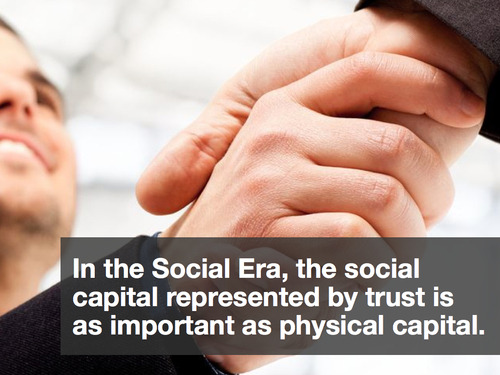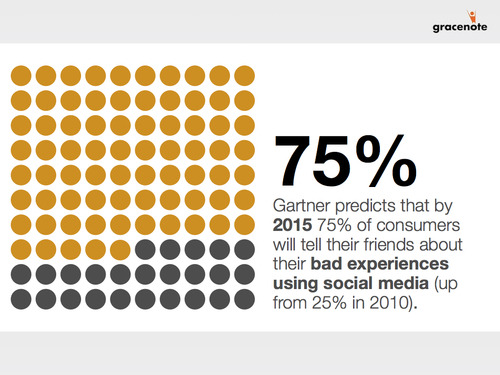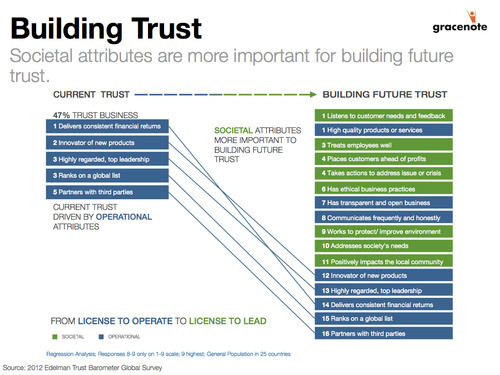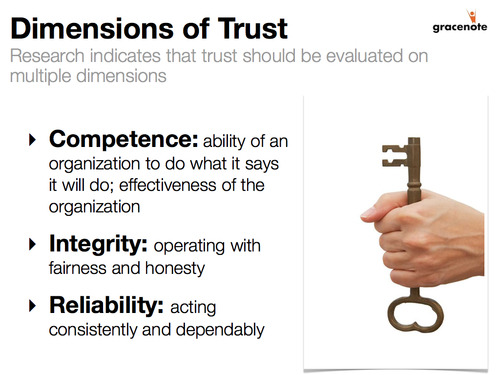What is essential is invisible to the eye.
– Antoine de Saint Exupery (Le Petit Prince)
In the past decade, behavioral economists have changed the way we look at consumer buying behavior. The image of the consumer making unfettered “rational” choices has given way to a greater understanding of economic activity and the many “irrational” factors that influence purchase decisions. We’ve learned that economic life is pervaded by culture and also depends on moral bonds of social trust. Today, companies with strong brands are winning in the marketplace because they understand a simple yet profound truth: that the social capital represented by trust is just as important as physical capital. In the Social Era, cultivating trust is one of the most important activities that companies pursue.

All of this has shaped our thinking about experience, brands, and trust. Today, more and more of us recognize the relationship between a customer’s experience with a company, their perceptions (i.e., the company’s brand) and their level of trust. And, we recognize that trust is essential for building enduring relationships with customers. Trust also benefits customers in many ways—which is why people will purchase more when trust is present. Companies can take steps to ensure that their behavior leads to trust on a continuous and consistent basis. And, it is possible for companies to measure, improve, and monitor trust.
Trust benefits consumers in many ways. One of the benefits is that it saves time. Consider the experience of a person shopping for groceries who is concerned about healthy food and the environment. If the person doesn’t trust that the grocer necessarily shares these concerns, they may spend more time looking at the nutrition labels and evaluating how sustainably each item was produced. If, however, the same person shops at Whole Foods, where they trust that the company shares their concerns, they can shop with greater ease and convenience without the need to scrutinize each purchase. They trust that Whole Foods has already done this for them. This is a simple example of how trust reduces the friction in economic transactions.
In the Social Era, people share their experiences of companies more than ever. Don Peppers, co-founder of the Pepper & Rogers Group, recently remarked, “As technology marches on, it will lead to the inevitable revolution of businesses acting in the genuine interest of their customers.” Customers are very likely to share both their positive and negative experiences of companies via social media, and analysts predict that this will only accelerate.

Trust is like a ratchet that is more easily turned in one direction than another; it can be lessened by the actions of companies much more easily than it can be developed. Edelman, the world’s largest public relations firm, has conducted a trust survey for the past twelve years. The survey highlights a dramatic decline in trust in CEOs, governments, and businesses, especially banks and financial institutions. The survey also highlights how trust can be developed in the future—especially through societal attributes such as listening to customer needs, placing customers ahead of profits, and engaging in ethical business practices.

Given the importance of trust, it is essential for companies to take steps to improve it. And, in order to improve trust, companies must begin by measuring it. Companies should measure and evaluate trust along multiple dimensions.

One of the easiest ways to do this is by incorporating a trust metric into customer surveys. Listening posts are already in place for most companies; however, trust measures are rarely included. Trust is difficult to measure, and measurement shouldn’t be limited to survey scores. Some other tools and techniques to measure trust include:
- Experiment designs
- Ethnographic studies
- Focus groups
The essential role of trust in society and commerce is becoming better understood. Companies that recognize this and take steps to improve trust will thrive in the Social Era. Those that fail to do so face the steep uphill climb to irrelevance.




While I don’t think social media has had that much influence on trust issues, I agree 100% that consumer behavior isn’t “logical” or analytic, and that trust may be THE huge issue for the next five years. I’ve said elsewhere that consistency and reliability, as you mention are the basis for that trust — predictability.
Some time ago I wrote an article on consistency as it relates to management behavior and the same principles apply to customer service. It may be better to be consistently average than to be really good sometimes and really good other times.
http://work911.com/articles/trustinconsistent.htm
Thanks for sharing your article. I really enjoyed it and agree that consistency of behavior and perceived values goes a long way towards building trust–both internally and externally.